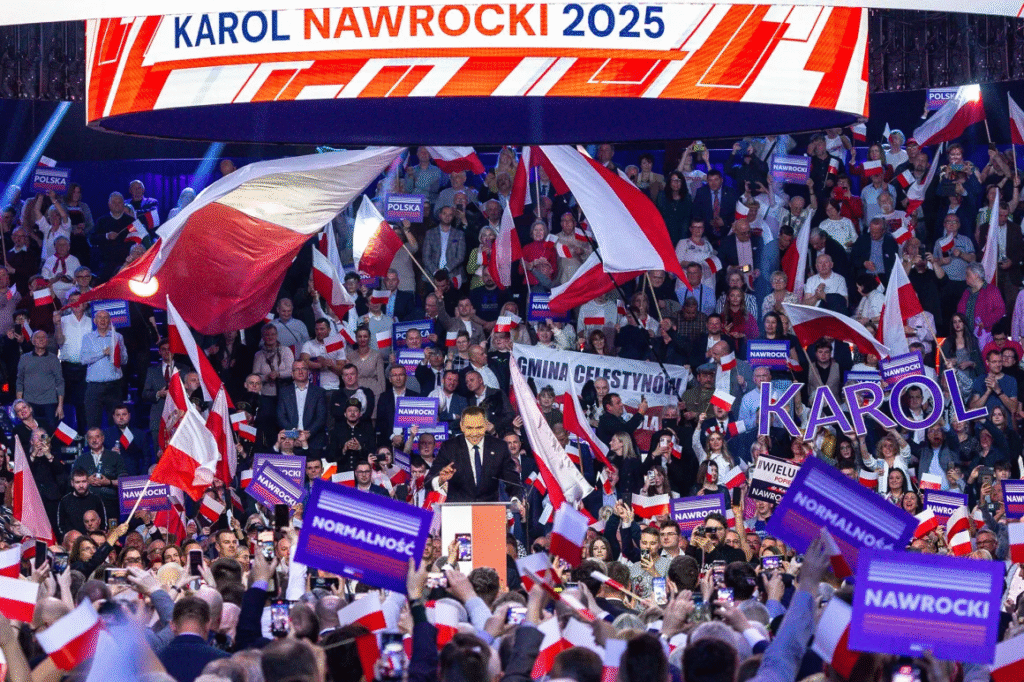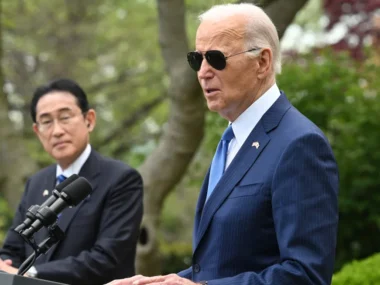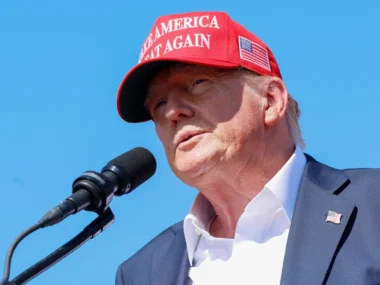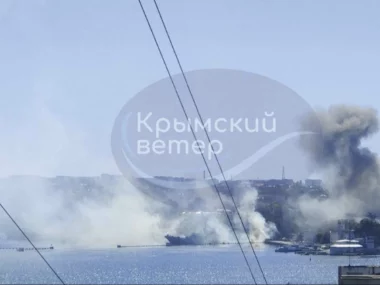One nationalist frequently wears a red cap reminiscent of Trump’s and aims to “make his country great again,” while the other visited Trump at the White House to gain backing. Both may soon lead countries neighboring Ukraine.
In Romania, far-right, euroskeptic candidate George Simion decisively won the first round of the presidential re-run on Sunday, making him the frontrunner for the May 18 final round.
That same day, Poland will hold its first round of presidential voting. Nationalist Karol Nawrocki and far-right challenger Sławomir Mentzen are gaining traction. If no one secures over 50% of the vote, a runoff will follow two weeks later. While Simion appears more likely to win than his Polish counterparts, the rise of MAGA-style nationalism in both countries is alarming Brussels.
Nawrocki congratulated Simion on social media, while Mentzen mocked the process by referencing Romania’s controversial election annulment last year. That vote was invalidated after intelligence agencies raised concerns of Russian influence over Calin Georgescu’s campaign, which led to his disqualification from this year’s race. Georgescu, accused of forming a fascist group, was barred from running. The unusual court ruling sparked public outrage and drew criticism from U.S. Vice President JD Vance, who, in a February speech, pointed to Romania as a prime example of Europe’s internal democratic threats.
Simion’s strong showing this May — with 41% of votes versus Georgescu’s 22% last November — suggests the court’s intervention may have amplified nationalist sentiment. His closest rival, centrist Bucharest mayor Nicusor Dan, earned just 21%.
EU supporters in Brussels hope pro-European voters will unite behind Dan in the runoff, as was seen in France’s recent elections. Still, political analysts say fragmentation among mainstream parties boosts Simion’s chances.
While both Romania and Poland operate under parliamentary systems, their presidents serve as commanders-in-chief and play influential roles in defense and foreign affairs.

Simion, positioned center-right, is seen voting alongside Calin Georgescu at a polling station in Bucharest, Romania, on Sunday.
Although Simion is less overt than Georgescu, he shares many of his views and even voted alongside him on Sunday. Simion has consistently opposed military aid for Ukraine and was banned by Kyiv last year for “systematic anti-Ukrainian activities.” He is also prohibited from entering Moldova. Simion denies being anti-Ukraine or pro-Russia, describing himself as “pro-Romanian.”
In Poland, the situation is more complicated. With President Andrzej Duda, from the conservative Law and Justice Party (PiS), unable to run for a third term, Karol Nawrocki, head of the Institute of National Remembrance, is vying to fill his shoes. Meanwhile, Sławomir Mentzen, leader of the far-right Confederation Liberty and Independence alliance, has gained ground in the polls, though he is unlikely to reach the second round.
Nawrocki, though technically running as an independent, has PiS support. PiS, which became increasingly authoritarian during its eight years in power, was defeated in the 2023 parliamentary elections by a coalition led by Donald Tusk’s liberal Civic Platform party.
Nawrocki recently met Trump at the White House to mark the National Day of Prayer. After the meeting, Nawrocki shared with Polish broadcaster TV Republika that Trump had told him, “you will win.”

Polish presidential candidate Karol Nawrocki speaks at an event in Lodz in April.
Nawrocki has criticized Ukrainian President Volodymyr Zelensky, accusing him of behaving “indecently” toward his allies, aligning with U.S. Vice President JD Vance’s view that Zelensky isn’t sufficiently “grateful” for the support his country receives. Following Zelensky’s meetings with Trump and Vance in the Oval Office, Polish Prime Minister Donald Tusk, who took office in 2023, remarked that it is becoming increasingly clear who in Poland is aligned with Russian interests.
Nawrocki, currently polling at around 25%, trails Rafał Trzaskowski, the centrist mayor of Warsaw and member of Tusk’s Civic Platform party, who leads with approximately 33%.
However, Simion’s stronger-than-expected poll performance provides a boost for Poland’s conservative candidates.
Mentzen, a further-right candidate, noted that Simion’s first-round victory demonstrated that “Romanians again want to choose differently than the EU elites would like.” Mentzen, who has closely aligned with Trump, has called for a MAGA-style “revolution of common sense” in Poland.











